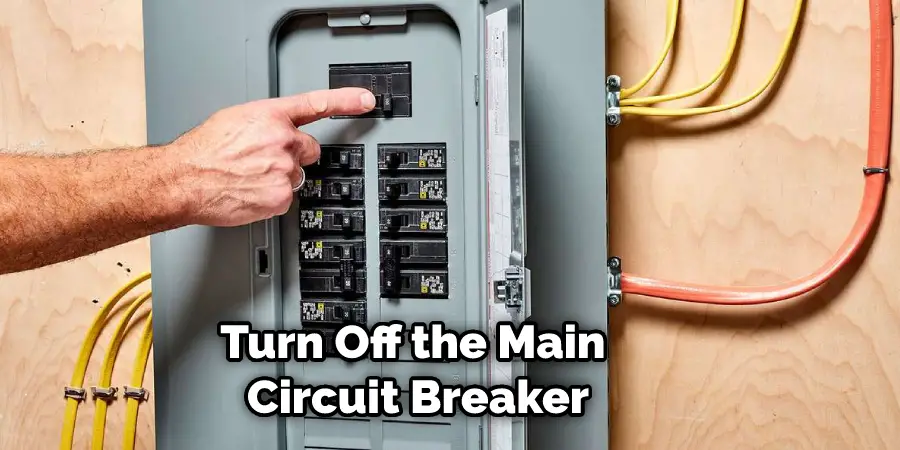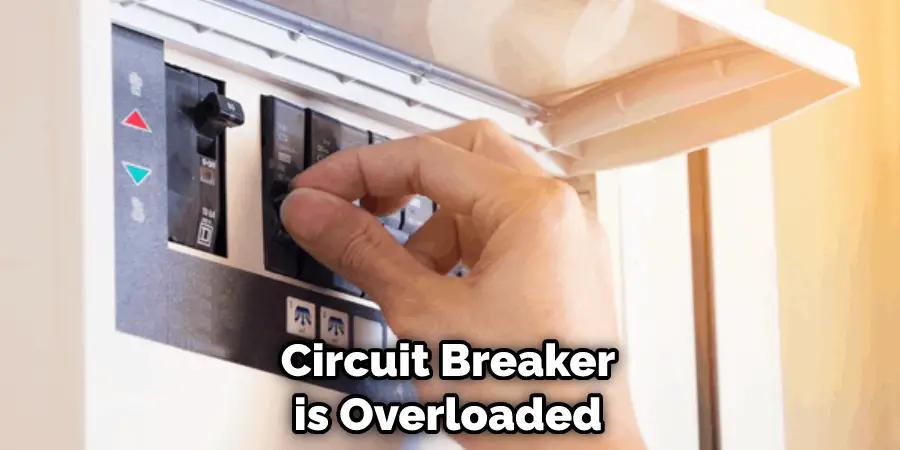We’ve all been there. You’re flipping through the channels, and you see that last bastion of summer weather – a beautiful day outside with an excellent breeze blowing. The sun is shining, and suddenly, you feel an itch inside to get up and enjoy it. So you do. You turn off the TV, walk out the door… and then your AC kicks on. Suddenly, your whole house is plunged into darkness because your lights can’t keep up with the wattage demand from the AC unit. What’s going on? In this article, we’ll discuss why do my lights dim when my AC turns on. Read on to find out!
Summary: When the AC is turned on, the electric current travels through the wires in the house and turns on all the lights. The current also passes through the lightbulbs, and because they are made of metal and plastics, they get hot. The heat makes the lightbulbs start to flicker, and after a while they will stop working altogether.

Ac is short for “air conditioner” and is a common household appliance. It is used to cool down a room by pumping in cold air. When the AC unit turns on, it pulls electricity from the outlet to power its compressor and fans. This increased demand can cause your lights to dim because they cannot handle the extra load.
Detailed Guide on Why Do My Lights Dim When My AC Turns On
There are a few potential reasons why your lights might dim when your AC turns on.
Reason 1: Damaged or Loose Wires
Your lights might dim when your AC turns on because of damaged or loose wires. If the wiring in your home isn’t in good condition, it could cause a power shortage when the AC kicks on, which would then dim your light bulbs. So if you’ve been noticing that your lights are dimming more than usual, it might be worth having an electrician come to look at your wiring to see if there’s something wrong.

Reason 2: Damaged or Weak Capacitor
There could be another reason your lights dim when your AC turns on- a damaged or weak capacitor. Capacitors store energy and release it when needed, like when the AC compressor starts up. If your capacitor is broken or inefficient, it might not be able to handle the extra load from the AC compressor, which will cause your lights to dim.
If you think your capacitor might be the problem, have an electrician take a look. They can test it to see if it’s damaged or weak and, if need be, replace it for you. Replacing a capacitor isn’t a difficult task, but it’s best left to a professional.
Reason 3: Overloaded Circuit
Your lights might dim when you turn on your AC because you have an overloaded circuit. Adding too many appliances to a single circuit can cause the current to flow too quickly and overwhelm the wiring. This can lead to a fire hazard or even an electrical shock. If you think this might be the problem in your home, it’s best to call a professional electrician to investigate and make repairs as necessary.

So, those are three potential reasons why your lights might dim when you turn on your AC. If you’re experiencing this issue, it’s essential to troubleshoot and identify the root cause so that you can take corrective action.
How to Fix Dimming Lights When the AC Turns On
If your lights are dimming every time you turn on the AC, don’t worry. There are several things you can do to fix the problem.
First, make sure that your light bulbs are in good condition and adequately rated for use with an AC unit. If they’re not, replace them with bulbs that are.

If your light fixtures are not working properly, check to see if anything is blocking the airflow. Make sure that the vents or fans in your AC unit are not obstructed, and move any furniture or other objects that may be blocking them.
Third, ensure that your AC is an appropriate size for your home. If it’s too small, it may not be able to handle the extra load when it comes on, which can cause your lights to dim.
Fourth, have your AC unit serviced by a professional to make sure that it’s in good condition and is working correctly. If there is something wrong with it, it may be causing your lights to dim.
If you’ve tried all of these things and your lights are still dimming, there may be something wrong with your electrical wiring. In this case, you should call a professional electrician to inspect your system and correct the problem.
Prevent Your Lights from Dimming When Your AC Turns On
Summertime means hot weather and air conditioning. But while your AC is running, have you ever noticed that your lights dim a bit? Don’t worry, and you’re not the only one. This happens to many people, and there are a few things you can do to prevent it.
The first thing to do is check the wattage of your light bulbs. If they’re too high for the amperage of your circuit, they could be causing the problem. Next, try swapping out some of your higher wattage bulbs for lower wattage versions and see if that solves the issue.

If it doesn’t, you may need to add a dimmer switch to your circuit. This will allow you to adjust the amount of power going to your lights, which can help them stay brighter when the AC is running.
If you’ve tried both of these things and your lights are still dimming when the AC comes on, you may have a faulty wiring issue. In this case, it’s best to call in a professional electrician to look at things and get them fixed up.
But hopefully, one of these tips will help you keep your lights from dimming when your AC turns on. Stay cool this summer!
How Do You Fix an Overloaded Circuit Breaker?
When an electrical device in your home starts to draw too much power, the circuit breaker that supplies power to that device will trip. This is a safety mechanism designed to protect your home from a fire. If one of your appliances is constantly tripping the breaker, you might need to get a new one that’s not quite so power-hungry or install a more powerful breaker. If there’s something wrong with your wiring, it’s best to call a professional electrician.
If you have determined that the problem is not with your wiring and you need to upgrade your breaker, these are the steps you’ll need to take:
- Turn off the main circuit breaker for your home.
- Locate the breaker panel and remove the cover.
- Find the breaker that is tripping and switch it off.
- Replace the breaker with one that has a higher amperage rating.
- Put the cover back on the breaker panel and turn on the main circuit breaker.
- Test your appliance to see if it trips the breaker again.
If you have any questions about this process, please get in touch with a licensed electrician in your area.

Why Are My Lights Dim All of a Sudden?
After years of reliable service, it can be quite a shock when your home’s lights start to dim and flicker. There are several potential causes of this problem, but the most common is simply an aging electrical system. Over time, wires can become loose or damaged, and connections can corrode.
As a result, electrical systems may not be able to handle the same amount of power as they did when they were new. In some cases, tightening connections and replacing worn-out parts can solve the problem. However, if your electrical system is very old or significantly damaged, you may need to replace it entirely.
The first step is to identify where the bedbugs are living. Check around the seams of your mattress and look for brown or black spots. These can be bedbug droppings or actual bugs. If you see live bugs, try to capture them in a jar so that you can show them to a professional. If you find bedbug droppings, vacuum them up and place them in a sealable bag.
Can a Faulty Circuit Breaker Cause Lights to Flicker?
A flickering light can be annoying, but it may also signify a serious problem. One possible cause is a faulty circuit breaker. If the circuit breaker is not making a good connection, it can cause the lights to flicker. Another possibility is that the circuit breaker is overloaded.
If too much electricity flows through the breaker, it will trip and cause the lights to flicker. If you are experiencing flickering lights, it is essential to have an electrician inspect your electrical system to determine the cause. Ignoring the problem could result in severe damage or even a fire.

Frequently Asked Questions
What Would Cause Lights to Dim?
Lights can dim for a variety of reasons, including inadequate lighting levels in an area, the use of fluorescent light bulbs that emit short-wavelengths (such as mercury), or age. If you are experiencing problems with your lights flickering or going out randomly, it is important to get them checked by a professional. This might involve replacing the bulb(s) or installing new wiring in the house.
If you’re only experiencing occasional issues with your lights, there are some simple solutions that you can try on your own.
One option is to switch to incandescent light bulbs instead of CFLs or LEDs. Another solution is to install supplemental lighting near areas where illumination is needed most – like the hallway was and stairs – so that areas remain well-lit throughout the day.
What Does It Mean When Lights Dim in a House?
When lights in a house start to dim, it typically indicates that there is a problem with the electrical system. The most common cause of this type of issue is an overloaded or aged wiring circuit. In some cases, the wires may be touching each other and creating short circuits. Over time, this can lead to excessive wear and tear on the electrical components, which can eventually result in failure.
Why Are My Lights Flickering and Dimming?
There are a few possible causes of flickering and dimming lights, including faulty wiring, loose connections, PSUs that are not properly insulated, or an incorrect switch configuration. If you’re unsure which option to take, call an electrician.
In general, it’s important to institute regular maintenance procedures for your home’s electrical systems in order to keep them running smoothly and prevent any potential issues. This includes checking the voltage levels at each circuit breaker panel and ensuring that all switches and outlets are compatible with the current outlet specifications.
Additionally, make sure wires are properly stranded (separated by type of insulation), and wired correctly within a conduit system using cover plates or GFCI protection strips. Finally,-if necessary-replace old power cords with new ones that have been specifically designed for indoor use.
Conclusion
If you’re like most people, your lights dim when you turn on your AC in the summer. You may have even wondered why this happens. While it’s not entirely clear why this occurs, there are a few possible explanations. One possibility is that the compressor in the AC unit creates a magnetic field that interferes with the flow of electricity through the light bulbs. Another explanation is that when the AC turns on, it pulls more current from the electrical grid than the light bulbs can handle, which causes them to dim. We hope you have learned why do my lights dim when my ac turns on.
